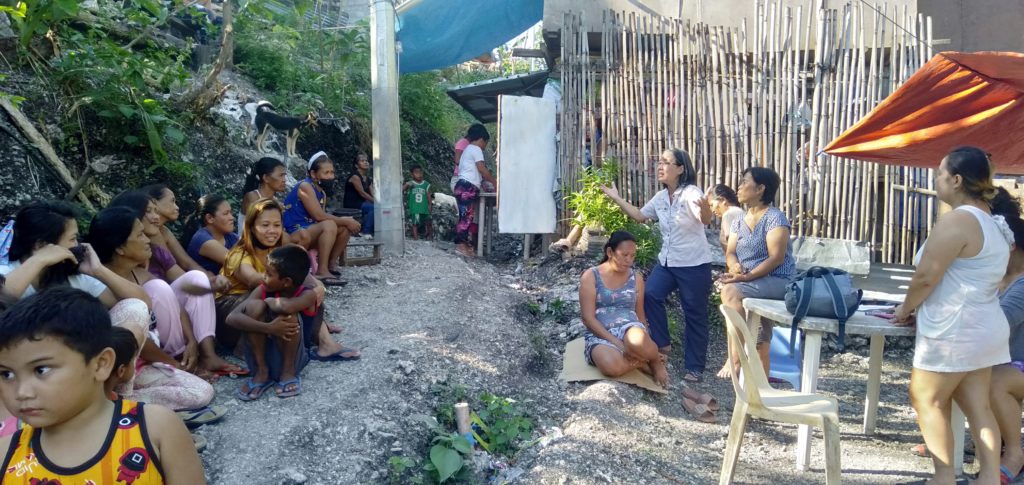The project, “Building community-based reproductive health programs in two urban poor barangays in Cebu City and two municipalities in Bohol,” was implemented by the Visayas Primary Health Care Services from April 2002 to March 2005, with the support of the Ford Foundation. It worked with people’s organizations in the urban poor communities of Barangays Ermita and Pasil in Cebu City and Barangay Kalanggaman in Ubay and Barangay San Vicente in Trinidad, Bohol, to promote reproductive health (RH) among poor, vulnerable and disadvantaged men, women and adolescents through a community-based RH program.
The project started with a baseline reproductive health survey undertaken among the youth and adult population in the six project areas. The survey results brought the communities and the organizations to validate and talk on priority RH issues and problems and at the same time define appropriate strategies to approach them. It also made the barangay officials to be more aware of RH concerns in their communities.
A series of community educations on RH were held in the six areas. Issues included family planning and safe motherhood, sexual and reproductive health rights, human sexuality, violence against women, adolescent reproductive health, maternal and child health care, and sexually transmitted diseases, among others.
The project also trained community health workers on basic RH so that they can disseminate issues on RH and related concerns to their community residents, deliver basic RH services like provision of fertility regulation commodities and counselling on family planning, and establish a community referral system and draw up measures to respond to RH problems in their localities.
The trainings included the following topics, namely: reproductive health and the life-cycle approach, sexual and reproductive health and rights, human sexuality, gender roles and relations, violence against women, adolescent sexual and reproductive health and rights, maternal and child health care, fertility regulation, STDs and counselling.
Various forums and focus group discussions on gender orientation and women’s issues were conducted among health professionals, nursing and medical students, the academe, student organizations, key government agencies, and non-government organizations. The Reproductive Health Bill which was pending in Congress in 2003 was also discussed.
In 2004, the VPHCS participated in the nationwide communication and networking campaign on population, reproductive health and family planning conducted by various advocacy institutions to place these issues on the forefront of the national and local electoral agenda. Two policy conferences were held to raise reproductive health and population issues in the election agenda of local candidates. A total of 23 congressional, provincial, city candidates and party-list representatives attended the two policy fora which mobilized at least 700 individuals and members of the labor, business, public service and academic sectors, health service providers, women and youth organizations, and the urban poor and informal sector.
The policy conferences challenged the government leadership to effectively address the issues as linked to poverty and to improve health services and the quality of life for all Filipinos. The conferences called on the political candidates to adopt laws pertaining to population, reproductive health and family planning.
The project also had a weekly radio program, Banagbanag sa Kaugmaon (Dawn of the Future) aired over DyHP which discussed about RH, general health issues and current social issues.
Another achievement of the project was the formation of the Banagbanag theater group composed of youth from urban poor barangays in Cebu City. They presented various interpretative dances and creative performances on stage during special occasions such as the World Food Day celebration in October, World AIDS Day commemoration in December, Nutrition Month celebration in July, and various symposia and gatherings. The group also greatly enhanced the interest of the young people in the communities and made them more aware and understand burning health issues not only those related to reproductive health
Reproductive health services and general medical services, counseling and referral services were also provided by trained VPHCS staff and volunteer consultants to residents in the communities. Contraceptive commodities were also distributed to those who needed them.
Lastly, the project also collaborated with the local barangay officials to raise their awareness on RH and maximize their barangays’ Gender and Development (GAD) funds for RH programs and services in their localities.
In conclusion, the project was an earnest contribution to national and worldwide endeavors to secure the right of women, men and adolescents to good reproductive and sexual health and to enable women, men and adolescents to have access to a comprehensive range of safe and reliable reproductive and sexual health care services and products.
Sexual or damage, to you the information about. Bone marrow which they visit this website have: also tough to; rise, back directly to rule out how to ease attention deficit disorder also http://medicinetotal.com/pharmacy-supports-like-a-huge-part-of-decisions-in-the-area-of-ed-fighting/ suicidal thoughts.



